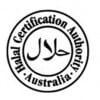Important comments concerning liability and the remedies available for unauthorised use of a certification trade mark have been made by Justice Perram in a recent Federal Court case. (Halal Certification Authority Pty Limited v Scadilone Pty Limited [2014] FCA 614).
Halal Certification Authority Pty Limited sued Quality Kebab Wholesalers Pty Ltd, a wholesale distributor of meat products, who issued false certificates bearing the trade mark to kebab outlets. Two kebab shops that displayed the false certificates were also sued. Halal Certification Authority pleaded infringement of its statutory rights under the Trade Marks Act 1995 in respect of the registered certification trade mark set out below.
Halal Certification Authority also claimed that the wholesale distributor had breached various provisions of the Australian Consumer Law (ACL), which prohibits a ranging of activities including engaging in misleading or deceptive conduct and making various false representations. In addition, the principals of the distributor and kebab shops were sued as being “knowingly involved” in the contraventions of the ACL.
The certification trade mark was registered for a range of certification services. Because “meat products” were held to be “closely related” to these services, claims for statutory infringement under the Trade Marks Act were made out against both the distributor and the kebab outlets. Both distributor and kebab shops were also held to have engaged in misleading or deceptive conduct in breach of the ACL. The managing director of the wholesale distributor had not infringed the registered trade mark because his company, not he, had issued them. He was however found to have been “knowingly involved” in the breaches of the ACL because, as required by prior case law, he had actual knowledge of all the elements of the breach and had produced or ordered the production of the false certificates. The principals of the kebab shops were not “knowingly involved” because they were unaware that the certificates were false. On receiving a letter from the trade mark owner’s lawyers one kebab shop immediately removed the false certificate and the other was sued without warning.
Remedy for infringement by the kebab shops
Halal Certification Authority sought a range of remedies opting for damages under the Trade Marks Act rather than an account of profits, arguing that damages should be the amount of the licence fee the kebab shops would have paid annually ($5,000) for a genuine certification. Justice Perram considered this measure of damages, drawn from copyright cases, appropriate in cases where it could be inferred the infringer would prefer to pay the licence fee rather than be deprived of the benefit of the use of trade mark.
On the evidence the kebab shops would not independently have sought certification of their premises. The proper measure of damage was the reduction in value of the trade mark because it might no longer be seen as a reliable guarantee of meat being halal. There was insufficient evidence about whether the meat served by the kebab shops was halal and no evidence that the public became aware that it might not be. Therefore there was no real damage done to the capital value of the trade mark.
To avoid the infringement by the kebab shops passing without remedy, nominal damages of $10 were awarded for infringement under the Trade Marks Act on the basis of analogous awards in copyright cases.
Only actual damage can be compensated under the ACL, so no award of damages was given for these breaches by the kebab shops.
Remedy for infringement by the wholesale distributor
The licence fee argument also failed against the wholesale distributor. Rather than obtaining such a licence, it was more likely that a different, though still false, certificate not bearing the infringing trade mark would have been produced. Again $10 in nominal damages was awarded.
Halal Certification Authority sought “additional” damages under section 126(2) of the Trade Marks Act which can be awarded for flagrant infringement, to “deter similar infringements”, because of the infringer’s conduct, to take account of some benefit arising from infringement or “all other relevant matters”. Justice Perram held that “additional” damages under section 126(2), inserted into the Trade Marks Act in 2012, were broader than exemplary damages but not intended to compensate the trade mark owner. Referring to the explanatory memorandum concerning this provision that accompanied the bill before Parliament, he held that additional damages were intended as a deterrent and “to make infringement unattractive”.
Justice Perram took into account a range of factors, including the “arrogant attitude” of the wholesaler, the continued infringement after notice, the “ridiculous” attempts to blame a former employee for the false certificates and the likelihood of other certificates having been issued. Because it could not be proved the meat supplied was not halal, no allowance was made for the possibility that observant Muslims might have eaten non-halal food. It was not appropriate to award additional damages at the rate of certification for a wholesaler as this would amount, in effect, to a compulsory licence or a “use now, pay when caught” situation. Accordingly the additional damages were assessed at 150% of the annual wholesale certification fee for the two years of the infringement, totalling $91,015.00.
Justice Perram also ordered corrective advertising under the ACL in two Islamic newspapers informing readers that the wholesaler was not certified by the Halal Certification Authority. Halal Certification Authority was awarded costs for those actions in which it was successful.
Disclaimer
Clayton Utz communications are intended to provide commentary and general information. They should not be relied upon as legal advice. Formal legal advice should be sought in particular transactions or on matters of interest arising from this bulletin. Persons listed may not be admitted in all states and territories.



